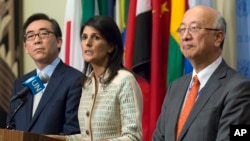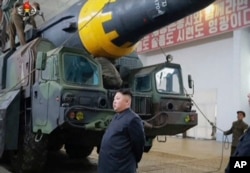The head of the U.S. Pacific Command warned Wednesday that the combination of ballistic missiles and nuclear warheads in the hands of North Korean leader Kim Jong Un represents "a recipe for disaster."
Speaking at an event in Tokyo, Admiral Harry Harris Jr. said every test North Korea carries out brings it a step closer to the ability to launch nuclear-tipped missiles.
"I must assume that Kim Jong Un's claims are true, because I know his aspirations certainly are," Harris said. "So I take him at his word ... and that should provide all of us with a sense of urgency to address this problem now."
The U.S. ambassador to the United Nations told countries Tuesday that they must join the effort to prevent North Korea from getting a nuclear weapon, warning they could face sanctions themselves if they help the rogue state achieve nuclearization.
Nikki Haley spoke ahead of a closed meeting of the U.N. Security Council called by the U.S. and council member Japan, along with South Korea, to discuss Pyongyang's latest illicit ballistic missile launch.
"You either support North Korea or you support us, because that's what it comes down to," Haley told reporters.
Speaking of the enforcement of international sanctions, she added this warning: "The United States is not past looking at third-country entities who are helping North Korea, and putting sanctions on them, because if you are supporting North Korea, you are against the rest of the international community."
Council members met Tuesday following Pyongyang's May 14 launch of a mid- to long-range missile that traveled 800 kilometers before landing in the sea west of Japan.
Strong condemnation
It was North Korea's second missile test in as many weeks, and came just four days after Moon Jae-in took office as president of South Korea.
"Obviously, Pyongyang, with this missile launch, Pyongyang tried to test the resolve of the new government in its pursuit of denuclearization of North Korea," Seoul's U.N. Ambassador Cho Tae-yul told reporters.
He said South Korea's new leader had been clear that his government would respond to North Korean provocations and would consider dialogue only if and when there was a change in the North's behavior.
In a statement Monday evening, Security Council members "strongly condemned" both of the recent missile launches and expressed their "utmost concern" over North Korea's "highly destabilizing behavior and flagrant and provocative defiance of the Security Council."
North Korea's Foreign Ministry rejected the statement, saying it called into question the country's nuclear deterrence for self-defense purposes.
U.N. Secretary-General Antonio Guterres also condemned the launch, saying it violated Security Council resolutions and was a threat to peace and security in the region. He urged Pyongyang to ensure full compliance with its international obligations and return to the path of denuclearization.
"We need to put further pressure on North Korea to make them feel that they have to change course," Japan's U.N. envoy Koro Bessho told reporters.
Sanctions expected
Many are expecting additional and stronger international sanctions. Last month, U.S. Secretary of State Rex Tillerson directly called on the international community to act before North Korea carries out a more serious provocation and to impose new sanctions. Washington and Beijing have been discussing possible measures, but it did not appear that a new resolution is imminent.
"China was really working with us in terms of tightening the sanctions, in terms of what they were saying to North Korea in trying to convince them," Haley said. "We have not seen anything from them in the past week, but we are encouraging them to continue moving forward."
The U.N. Security Council has imposed several rounds of increasingly harsh, targeted sanctions on North Korea since 2006. The last round, imposed in November 2016, took three months to negotiate.





